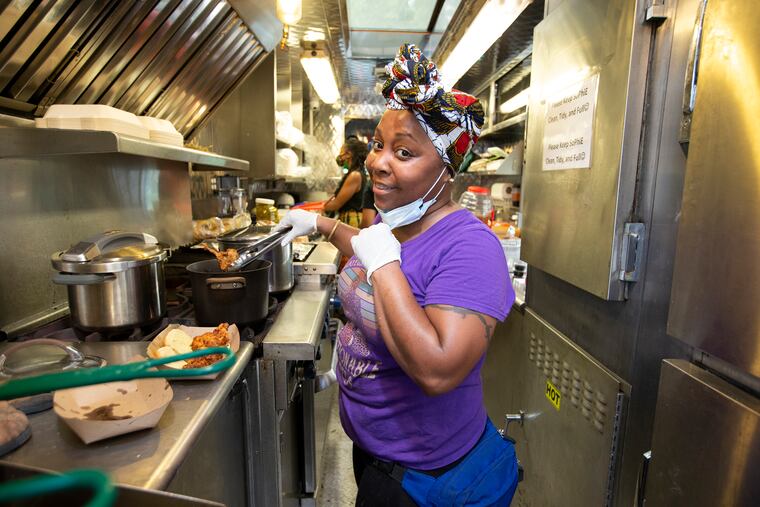Chef Nia Minard is bringing Mississippi hot tamales to a South Philly food truck
“Yes, Black folks have been making tamales for nearly 100 years in the Mississippi Delta, as immortalized by the Robert Johnson song, ‘They’re Red Hot.‘”

Growing up, Nia Minard didn’t think much of Mississippi hot tamales.
The tamales, part of a Black Southern food tradition, were sold all over her hometown of Yazoo City, Miss. People would buy them from a little stall on the street, unwrap the corn husks and smear some of the filling on a saltine cracker. There, they just called them hot tamales.
But in 2003, when Minard returned to Philadelphia, the place she was born, for college, she started to miss the foods that reminded her of home. Simple stuff you couldn’t get at soul food restaurants around the city. Fried chicken livers, stewed lima beans, and turkey necks.
“When you eat something all the time, it feels pedestrian,” Minard, 35, says. “It doesn’t feel that extraordinary. It was only when I came up here as a prodigal Southerner that I really started to value my own distinct foodways.”
That, she says, is what got her cooking: homesickness — and the realization that food can make a place feel like home.
Now, the self-taught chef is serving up her own take on her hometown comfort foods every Wednesday evening this summer in South Philly’s Mifflin Square Park. Operating out of a food truck run by SEAMAAC, an organization serving immigrants and refugees, Minard sells fried okra, hoppin’ John empanadas, and the quintessential hot tamale.
The dish is a Minard specialty. “It’s delicious, and it’s fussy, and it’s complicated,” she says, referring to the work that goes into hand-rolling the tamales.
It’s one she’s made for other culinary projects, like the 2017 Philadelphia Assembled Kitchen, which featured food inspired by poet Ntzoke Shange’s 1997 cookbook If I Can Cook/You Know God Can: “I need to know how we celebrate our victories, our very survival,” Shange wrote. “What did we want for dinner?”
» READ MORE: ‘Without culture, you’re lost’: Our Mothers’ Kitchens reclaims black womanhood through food and writing
To Minard, that was hot tamales.
“Unbeknownst to most folks up here in the Northeast, our South American sisters and brothers aren’t the only ones that make tamales,” she wrote in the Philadelphia Assembled Kitchen recipe book. “Yes, Black folks have been making tamales for nearly 100 years in the Mississippi Delta, as immortalized by the Robert Johnson song, ‘They’re Red Hot.‘”
What makes the hot tamale distinct from a Mexican or South American tamale is that it’s boiled, not steamed, Minard says, and it’s made with cornmeal instead of masa harina — which gives the hot tamale a grainier texture.
And it’s a wet, saucy tamale — she remembers eating a Mexican tamale in Philadelphia for the first time thinking: “This is delicious but I need some sauce.”
Roasted pork or chicken is traditional, though she also offers a vegan option with cubanelle pepper and sweet potato.
» READ MORE: For Philadelphia-area Muslims, breaking their daily fast brings a mix of emotions
She does not, however, offer a turkey option, even though it’s one of the regional quirks of Philly’s food culture that she both loves and disdains, as a self-proclaimed “pork woman in a turkey town.”
Muslim dietary restrictions have had a strong influence on Philly food culture, because of the many Black Muslims in Philly. Fried turkey chops, for example, are more common than fried pork chops on soul food menus, she noted.
“That’s an adaptation to people’s tastes,” she said. “You ain’t gonna make chitlins if people ain’t eatin’ em.”
Minard, who’s also an educator and used to run the student kitchen program for Sankofa Farm at Bartram’s Garden, says she loves those regional food differences because they show how African Americans have found a way to adapt and survive wherever they go.
They also point to the fact that, as Minard puts it, “there isn’t a monolithic Black America.”
» READ MORE: How murals tell the story of black Philadelphia
It was a notion that felt present on a recent Wednesday evening in Mifflin Square Park.
As a group of Southeast Asian boys played sepak takraw and community activists in red T-shirts spoke about fighting evictions, Minard served rosemary sweet tea and paper trays of hot tamales from a truck, bringing the Black Southern food of her childhood into the tradition of South Philadelphia.
Hot tamales (pork, chicken, or cubanelle pepper and sweet potato), 3 for $11; hoppin’ John empanada, $2 for small, $5 for jumbo; homemade rosemary sweet iced tea, $3; and more. Mifflin Square Park (6th and Ritner Streets), every Wednesday from 3 p.m. to 7 p.m. Prices may vary.